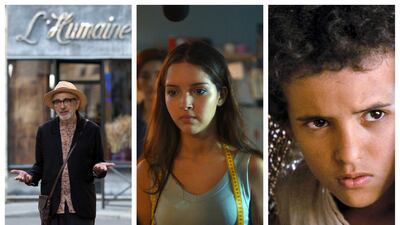More than half of the Arab films to ever be nominated for an Oscar have been made over the past decade, with titles such as Hany Abu Asaad's Omar and Ziad Doueiri's The Insult telling some of the best stories from the region.
The National presents a must-watch list of regional films currently available on streaming platforms in the UAE.
'It Must Be Heaven' (OSN)
This satirical film is the latest by Palestinian director Elia Suleiman. It won the Jury Special Mention award at the Cannes Film Festival last year and was Palestine's submission for the Academy Awards. In this semi-autobiographical tale, the film follows Suleiman as he travels from Paris to New York, seeking a new home, only to find similarities with his own homeland wherever he goes.
'Omar' (Netflix)
In 2014, Omar became Assad's second Oscar nomination, after Paradise Now in 2006. The film tells the story of a young Palestinian freedom fighter who is forced to work as an informant. At the centre of the film is also a love story starring Adam Bakri, who plays the titular role, and Leem Lubany, his love interest.
'The Insult' (OSN)
Directed by Lebanese filmmaker Ziad Doueiri, The Insult was the first film from Lebanon to be nominated for Best Foreign Language Film at the Oscars. Starring Adel Karam, the story looks at the relationships between Lebanese-Christians and Palestinian refugees in the country.
'Papicha' (OSN)
Algerian filmmaker Mounia Meddour's debut feature film Papicha was screened at Cannes last year. The film, which Meddour says is semi-biographical, follows Nedjma, 18, a student who loves fashion and going out with her friends. This lifestyle is challenged by a growing campaign for women to wear the burqa. After a dramatic attack, Nedjma decides to organise a fashion show as a symbol of resistance. The film won its main star Lyna Khoudri the Cesar Award for Most Promising Actress. Khoudri went on to star in Wes Anderson's The French Dispatch.
'Theeb' (Netflix)
Funded by Sanad Abu Dhabi Film Fund, Theeb tells the story of a young Bedouin boy who ventures into the desert with his brother and a British soldier. It was nominated for an Oscar for Best Foreign Language Film in 2016. Its Jordanian British director Naji Abu Nowar won Best Director Award at the 71st Venice International Film Festival and a Bafta for Outstanding Debut by a British Writer, Director or Producer.
'Wadjda' (Netflix)
Directed by Haifaa Al Mansour, who is considered Saudi Arabia's first female director, Wadjda was not only her directorial debut but also the first feature shot entirely in the kingdom. The film is about a little rebellious Saudi girl who enters a Quran recitation competition with the hopes that she wins enough money to buy her own bicycle.
‘Where do we go now?’ Netflix
This was director and actress Nadine Labaki's second feature film after Caramel. Where do we go now? was screened at Cannes in 2011 and was Lebanon's submission for the 84th Academy Awards, but did not make the short list. The film tells the story of a group of Lebanese women who are trying to defuse religious tensions between Christians and Muslims in their village.
‘Cairo 678’ (Shahid)
This was Mohamed Diab’s debut film, which created a lot of controversy because of its subject matter. The film focuses on three women whose stories intersect under the topic of sexual harassment in public places in Egypt. The film won the top prize at the Dubai International Film Festival in 2010.
‘Exterior/Night’ (Netflix)
Directed by Ahmad Abdallah, Exterior/Night is an Egyptian drama that follows a young filmmaker who takes a taxi ride and ends up meeting two strangers as they make their way through Cairo's backstreets. The film was screened at the 2018 Toronto International Film Festival and Sherief El Desouky won the award for Best Actor at the 40th Cairo International Film Festival for the role.
'Poisonous Roses' (OSN)
Fawzi Saleh's debut feature tells the story of Saqr, who dreams of a better life beyond his tannery job in the slums, but whose immense love for his sister ties him to the place. Poisonous Roses stars Egyptian actors Mahmoud Hemida and Merihan Magdi.
'Very Big Shot' (Netflix)
Very Big Shot was a hit for Lebanese director Mir-Jean Bou Chaaya at 2015's Toronto Film Festival. It also had a successful cinema release in the UAE, and was Lebanon's entry for Best Foreign Language Film at the 2017 Oscars.
'Heaven Without People' (Netflix)
This was Lucien Bourjeily's debut film, after he worked in theatre production for many years. The film tells the story of a family that gets together for a large gathering on Easter, for the first time in two years, but chaos breaks out as secrets start to unravel. The film won the Special Jury Prize Muhr Feature Award at the Dubai International Film Festival in 2017.
'When I Saw You' (OSN)
This was Palestinian filmmaker Annemarie Jacir's second feature film. When I Saw You tells the story of a boy named Tarek, 11, who lives in a refugee camp with his mother, with the hope that one day his father will return. However, as things get increasingly difficult for him, Tarek runs away. The film, which stars Saleh Bakri, was Palestine's entry for Best Foreign Language Film at the 85th Academy Awards. It also won Best Asian Film at the 63rd Berlin International Film Festival.
‘Yomeddine’ Shahid
This Egyptian drama film directed by Abu Bakr Shawky is about friendship. The film was selected to compete for the Palme d'Or at the Cannes in 2018 and won the Francois Chalais Prize at the film festival that year.
‘West Beirut’ (Netflix)
This was Doueiri's debut film, which went on to win the Francois Chalais Prize at Cannes in 1998. West Beirut's story follows three teenagers as they roam the streets of Beirut in the middle of the civil war and was filmed on a Super 8 camera.


